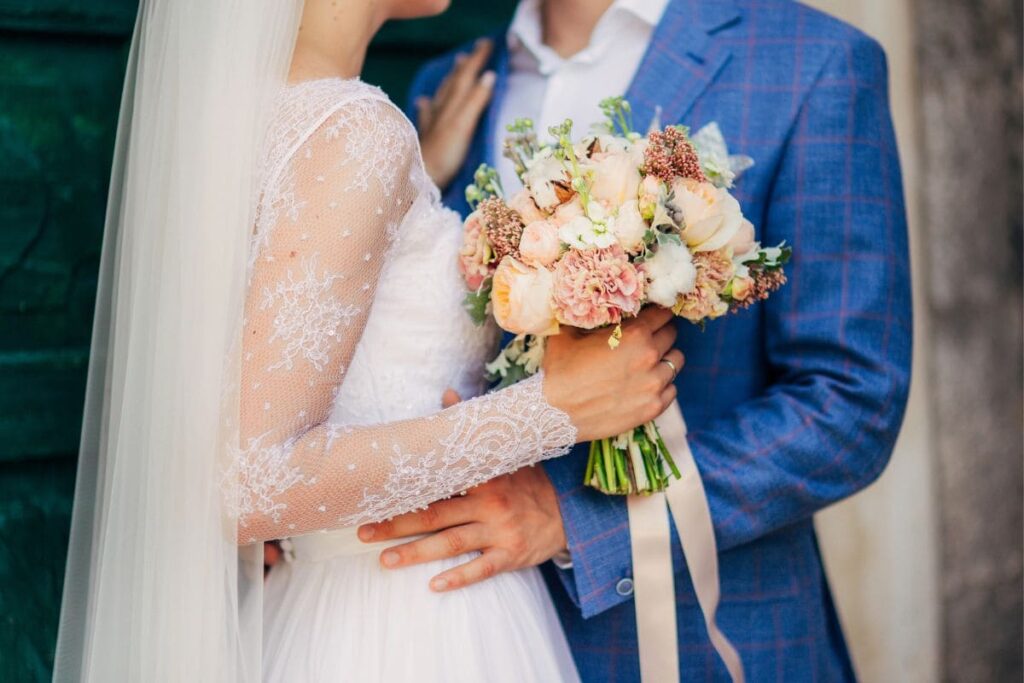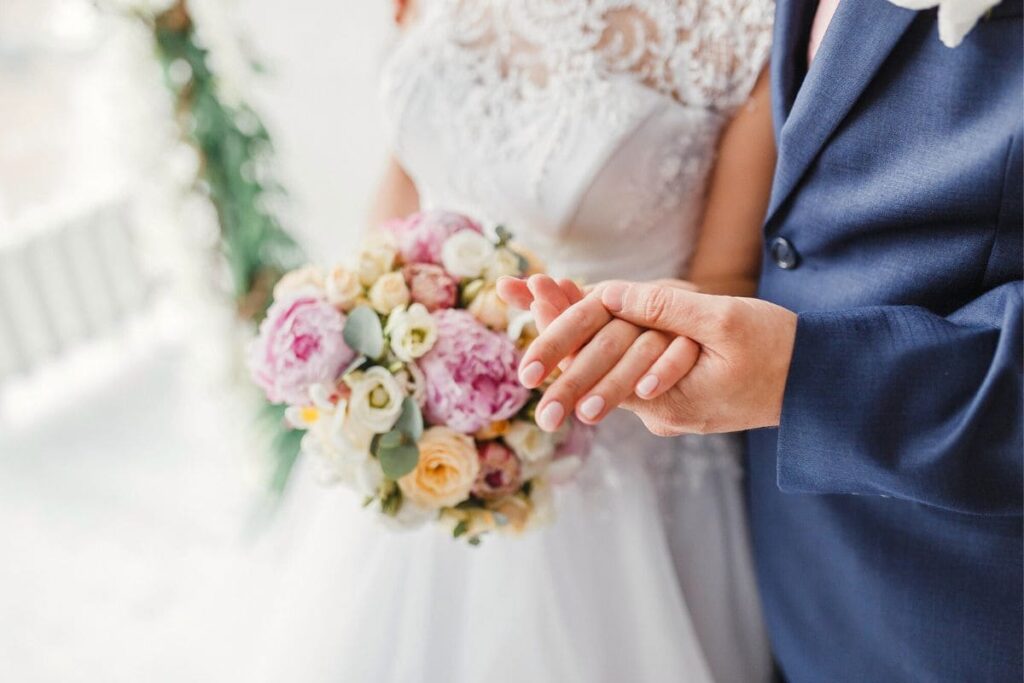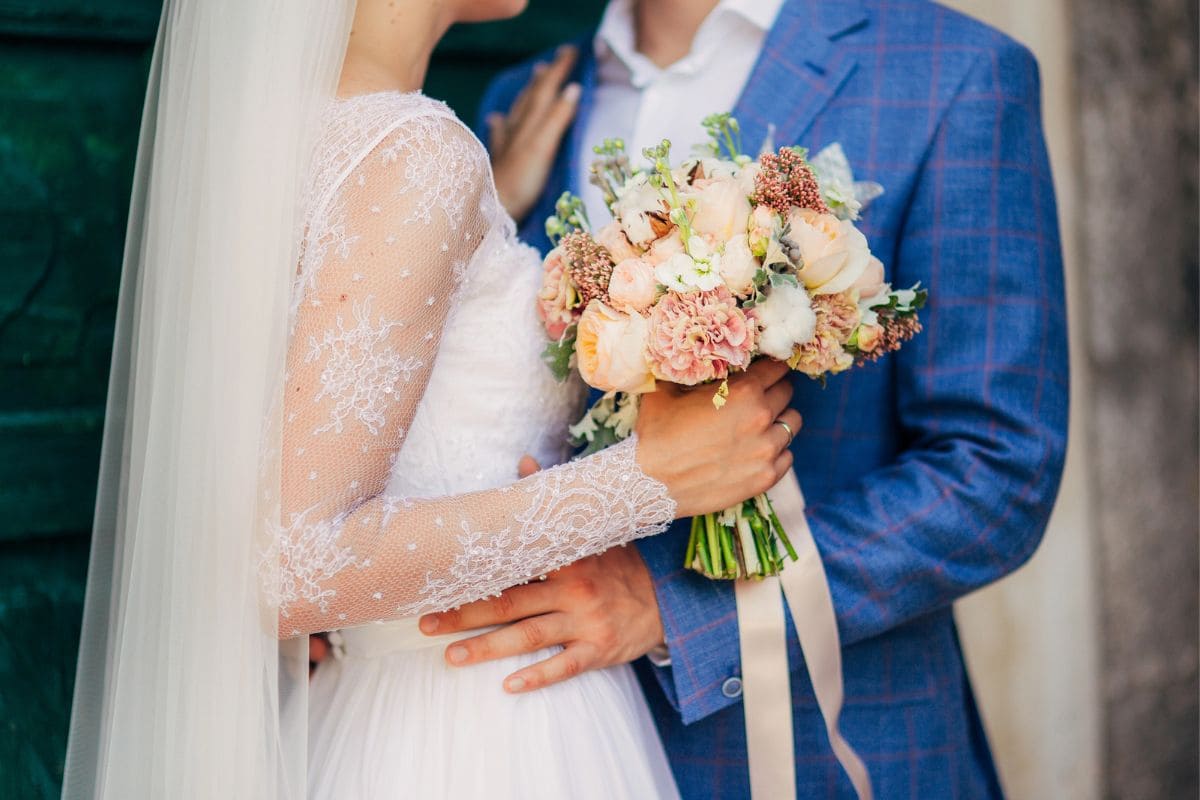Are you looking for a feel-good way to make money on the side? Here is how to become a wedding officiant and earn extra cash while celebrating love and commitment.
If you’re the kind of person who enjoys connecting with people but doesn’t love the grind of a nine-to-five gig, officiating weddings can be a great way to pick up a little cash while loading up on all those feel-good endorphins that come from sharing in a couple’s special day. Unlike a lot of wedding industry jobs, officiant work is also fairly recession-proof since folks will always need an officiant to tie the knot.
Whether you’re looking to build a full-time professional wedding business or simply supplement your gig economy income, officiating weddings is a relatively easy business to get started in. And it’s one of the few work from home jobs where your bonuses come in the form of cake.

How I Became a Marriage Officiant
My journey to the world of wedding officiating began with a good friend’s request. She had recently become engaged but found securing a non-denominational minister that met her needs trickier than expected. That’s when she remembered that years prior, I had signed up as one of the ministers of the Universal Life Church, an online ministry that allows anyone to register for an online ordination.
After looking up the officiant requirements in my state, I printed up my ordination certificate and headed down to my county clerk’s office. With just a little paperwork, my contact information was on file in the county clerk’s online catalog of wedding officiants. They briefly walked me through the process of filling out a marriage license, gave me my officiant filing number, and sent me on my way.
With the registration process behind me, I started writing my friend’s wedding ceremony script. One dreamy ceremony later, my friends were happily hitched, and I was an experienced wedding officiant.
Building My Personal Ministry
Like many ULC ministers, I truly had a chance to hone my skills as an officiant in 2015 when same-sex marriage was legalized. I knew several couples who had been waiting for years to make things official and couldn’t wait a moment longer, including a few who had once traveled all the way to Massachusetts to be united in a civil union.
Knowing how much my marriage to my husband since 2001 has meant to me and eager to share that joy with others, I took to social media and spread the word that I would marry any couple who wanted to get hitched that summer. Folks took me up on it, and I quickly started to get a reputation as a non-denominational minister with a knack for helping couples transform their wedding day visions into reality by crafting beautifully worded ceremony scripts. I also learned that in my state, many couples with a non-mainstream faith or unique personal aesthetic had trouble finding someone with the legal authority to wed them who would also perform their preferred ceremony type.
After that summer had passed, I decided to keep officiating weddings on the side, with a focus on providing affordable, heartfelt ceremonies and helping with tricky requests. Using my skills as a writer, I adapt the language of every ceremony to give each couple a ceremony as beautiful as their relationship. As part of my personal ministry, I also committed to marrying anyone who needs me for whatever they can afford to pay — I’ve even accepted a six-pack of sodas for my teenage kiddos.
Although that might sound like bad business, it hasn’t been. Soon, people started tagging me on Facebook anytime there was a request for flexible, professional officiants willing to think — and officiate — outside the box.
Working as a Wedding Officiant
One of the things I love most about running a wedding minister business is the opportunity to connect with clients who are specifically looking for someone like me. There’s a lot of room for flexibility in how an officiant chooses to run their business. Because I focus on personalized wedding ceremonies, I usually start by communicating with a couple to get a better understanding of their personalities and what they are looking for well in advance of the wedding.
In my home state, it’s up to the couple to pick up their marriage license. But I consider it part of my ministerial duties to make sure they remember their two required witnesses on the day of the ceremony. When we sign their marriage certificate, I take a moment to walk them through the step-by-step instructions and remind them to return the signed license by the required deadline after they come down from the wedding glow.
How Much Does a Wedding Officiant Make?
I set my officiant fee based on the complexity, time commitment, and driving distance involved with a couple’s requests, which can vary wildly from one ceremony to the next. I’ve married many couples who just want to meet me in a park or their home for a five-minute ceremony with their family members and other loved ones present.
On the other hand, I’ve married couples with elaborate ceremony requests. One was a complex theatrical production that required several rehearsals. For another, an interracial couple asked me if I would use my Martha Stewart skills to handcraft a ceremonial broom for their broom-jumping ceremony. I’ve performed handfastings, solemn religious ceremonies, and ceremonies that looked like they belonged in a Guns ‘N Roses video. And I had a blast doing all of them.
According to Wedding Wire, the going rate for a wedding minister can range from around $100 to $650 or more, with the average officiant charging around $300. How much you charge may also vary depending on the average cost of wedding officiants where you live and whether you’re offering some type of specialty service.

Getting Started as a Wedding Minister
Statutes surrounding marriage law can vary from state to state. American Marriage Ministries (AMM), another site that provides online ordination for a minister license, features a lengthy list of resources on marriage laws according to state where you can find out the rules where you live.
According to the AMM, online ordination is legal in every U.S. state, although some states do require officiants to register proof of your ordination with that state’s assigned marriage office. It’s also worth noting that those statutes can change over time. Although my state required ministers to register and use a license number for years, registration with the county clerk is no longer required in Oklahoma.
Once you’re official, it’s time to decide on a niche and start stocking up on wedding nuptials and ceremonies to pull from. Here are some great places to start:
- Books filled with sample wedding ceremonies
- Poetry readings
- Scenes from movies
- Scripture readings
- Classical literature
- Song lyrics
You’ll also want to consider creating a wedding day contract to protect yourself legally. The only thing left to do now is to create a social media presence and start building your connections. Sharing beautiful wedding pics and reviews and building relationships with other wedding businesses can also go a long way in building your wedding officiant business.
Become a Wedding Officiant: A Fun and Easy Home Business
A wedding officiant business is an easy line of work to get into if you love working with people, can handle standing in front of a crowd, and can keep a cool head when wedding day emotions are running high. It’s also one of the few home businesses you start with little to no money.
While the business tends to be seasonal, it’s fairly easy to build up a business with minimal investment. And while the monetary benefits can be fantastic, there’s really nothing like basking in secondhand wedding bliss while eating a gourmet cupcake the wedding couple insisted you try.

